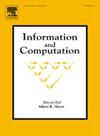Intersection and union hierarchies of deterministic context-free languages and pumping lemmas
IF 1
4区 计算机科学
Q3 COMPUTER SCIENCE, THEORY & METHODS
引用次数: 0
Abstract
We study the computational complexity of finite intersections and finite unions of deterministic context-free (dcf) languages. Earlier, Wotschke [J. Comput. System Sci. 16 (1978) 456–461] demonstrated that intersections of dcf languages are in general more powerful than intersections of d dcf languages for any positive integer d based on the separation result of the intersection hierarchy of Liu and Weiner [Math. Systems Theory 7 (1973) 185–192]. The argument of Liu and Weiner, however, works only on bounded languages of particular forms, and therefore Wotschke's result is not directly extendable to other non-bounded languages. To deal with a wide range of languages for the non-membership to the intersection hierarchy, we circumvent the specialization of their proof technics and devise a new and practical technical tool: two pumping lemmas for finite unions of dcf languages. Since the family of dcf languages is closed under complementation and also under intersection with regular languages, these pumping lemmas help us establish the non-membership relation of languages formed by finite intersections of target languages. We also concern ourselves with a relationship to deterministic limited automata of Hibbard [Inf. Control 11 (1967) 196–238] in this regard.
确定性上下文无关语言和抽运引理的交集和联合层次
我们研究了确定性上下文自由(dcf)语言的有限交集和有限联合的计算复杂性。早些时候,Wotschke [J]。第一版。系统科学16(1978)456-461]基于Liu和Weiner的相交层次的分离结果证明,对于任何正整数d, (d+1) dcf语言的相交通常比d dcf语言的相交更强大。系统理论7(1973)185-192]。然而,Liu和Weiner的论证只适用于特定形式的有界语言,因此Wotschke的结果不能直接推广到其他无界语言。为了处理各种语言的非隶属于交集层次,我们绕过了它们的证明技术的专业化,设计了一种新的实用的技术工具:dcf语言的有限联合的两个抽运引理。由于dcf语言族在互补和与正则语言相交的情况下是封闭的,这些抽运引理帮助我们建立由目标语言的有限相交所形成的语言的非隶属关系。在这方面,我们还关注与Hibbard [Inf. Control 11(1967) 196-238]的确定性有限自动机的关系。
本文章由计算机程序翻译,如有差异,请以英文原文为准。
求助全文
约1分钟内获得全文
求助全文
来源期刊

Information and Computation
工程技术-计算机:理论方法
CiteScore
2.30
自引率
0.00%
发文量
119
审稿时长
140 days
期刊介绍:
Information and Computation welcomes original papers in all areas of theoretical computer science and computational applications of information theory. Survey articles of exceptional quality will also be considered. Particularly welcome are papers contributing new results in active theoretical areas such as
-Biological computation and computational biology-
Computational complexity-
Computer theorem-proving-
Concurrency and distributed process theory-
Cryptographic theory-
Data base theory-
Decision problems in logic-
Design and analysis of algorithms-
Discrete optimization and mathematical programming-
Inductive inference and learning theory-
Logic & constraint programming-
Program verification & model checking-
Probabilistic & Quantum computation-
Semantics of programming languages-
Symbolic computation, lambda calculus, and rewriting systems-
Types and typechecking
 求助内容:
求助内容: 应助结果提醒方式:
应助结果提醒方式:


